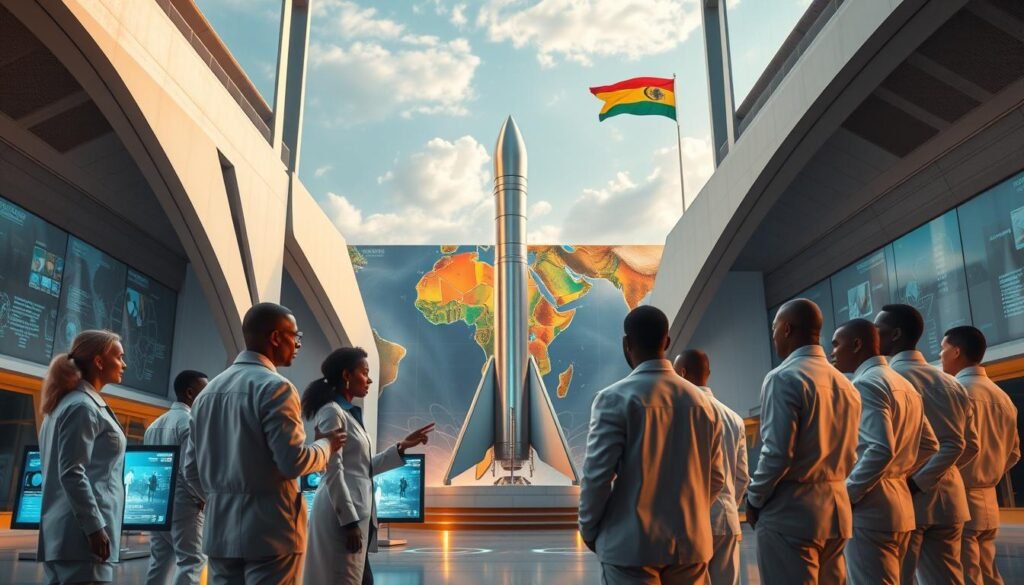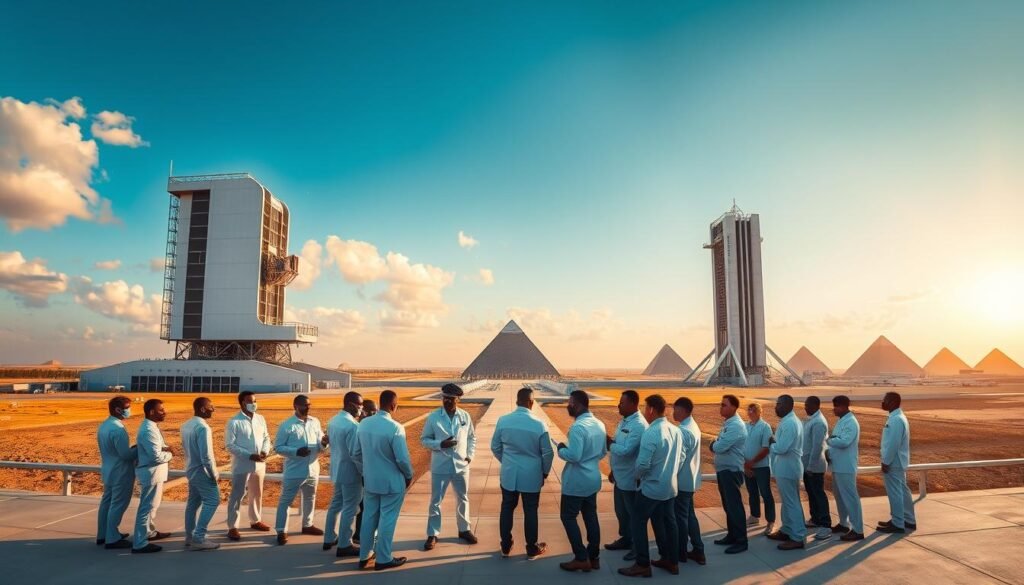When the African Space Agency Opened, Countries Like Egypt Joined

In April 2025, an inauguration in Cairo marked a major step for coordinated space work across a large continent. The new african space agency (AfSA) creates a shared hub for research, satellites, and applied solutions. Experts say this move shifts roles from hosting ground stations during Apollo-era missions to leading development of homegrown space technology.
AfSA’s site, built with external support, now houses operations within Egyptian Space City. This infrastructure aims to improve access to data for agriculture, disaster response, and urban planning. Observers note a €100 million Africa‑EU Space Partnership and diverse international cooperation as key accelerants.
Established programs such as Egypt and south africa join fast-growing efforts from Kenya, Ethiopia, and Rwanda under a national space framework. Analysts highlight an equatorial niche for science and a chance to scale cooperation across nations.
Key Takeaways
- AfSA inauguration created a continental hub for satellites and data-driven services.
- Historic ground roles (Apollo era) gave way to visible leadership and local development.
- Infrastructure and partnerships—EU funding, China-built facilities—boost capacity.
- Equatorial science offers unique measurements not available at higher latitudes.
- National space programs now coordinate to reduce duplication and scale cooperation.
AfSA’s April inauguration in Cairo signals a new chapter for African space cooperation
Cairo’s inauguration shifted regional activity from scattered projects toward unified governance and program delivery. That shift gives clear role definitions for national programs and helps scale shared services across the continent.
Why this event mattered for ambitions and global systems
The ceremony created an operational hub that can interface with the global space ecosystem. Experts note that a centralized space agency boosts credibility for partnerships and attracts sustained investment—illustrated by a €100 million Europe commitment.
From hosting ground infrastructure to building satellites
Historically, many sites provided ground support for foreign missions. The focus now is indigenous satellite design, manufacture, and operations tailored to local needs. That change moves effort from hosting equipment to owning capability.
Equatorial science as a niche advantage
The region’s equatorial position offers a distinctive edge for earth observation and space science. Specialized instruments and viewing angles can capture ionospheric dynamics that complement mid- and high-latitude data streams.
“Coordinated data and shared infrastructure turn national plans into regional services,” said a senior technical advisor at an African union meeting.
- Infrastructure build-out (China) accelerated readiness.
- South Africa already shares space-weather data with ESA for global services.
- National space programs form a pipeline of missions under AfSA coordination.
When the African Space Agency opened in April, spacefaring countries like Egypt,
Senior officials and technical heads converged to define roles, timelines, and shared services under a single institutional roof.

Who showed up: African Union Commission leaders, national agencies, and international space organizations
Attendance included H.E. Mahmoud Ali Youssouf (African Union Commission Chairperson) and H.E. Professor Dr Mostafa Madbouly (Prime Minister). Delegates from Côte d’Ivoire, Angola, and Egypt joined senior agency executives.
International participants were present as well: ESA’s Marco Ferrazzani, ASI’s Luca Maria Salamone, NASA’s Karen Feldstein, and UAE Space Agency’s Salem Butti Salem Al Qubaisi. AfSA Council President H.E. Dr. Tidiane Ouattara and Dr. Valanathan Munsami linked governance to delivery.
“Spacefaring” and “space-aspiring” nations collaborating under one roof
Collaboration framed the agenda. Delegates previewed programs and initiatives that allow broad participation by african nations across continent.
Leaders stressed operational communications channels for procurement, training, and data sharing. The presence of european space agency and uae space agency signaled ready pathways for technical cooperation and capacity building.
“Sustained cooperation will streamline mission pipelines and reduce duplication across agencies,” said an attending technical advisor.
- Political buy-in: African Union Commission, heads of ministries, and national space agency leaders.
- Practical cooperation: ESA, NASA, ASI, and UAE Space Agency offering technical assistance.
- Programs previewed: capacity-building fellowships, joint missions, and shared communications services.
Partnerships, programs, and services AfSA will coordinate across the continent
Partnerships struck at the launch create ready pipelines for earth observation, launch advice, and skills transfer. AfSA signed cooperation agreements with the european space agency (joint observation, training, technical support), the uae space agency (small satellite projects, educational exchanges), and Roscosmos (launch consultations and space science collaboration).
Funding and program continuity arrived via the €100 million Africa‑EU Space Partnership and GMES & Africa Phase II. These initiatives maintain open data access and build services—climate monitoring, agriculture analytics, and emergency response—useful across the continent.

Initial focus areas and governance
Early priority areas include earth observation, satellite communications, space science, and workforce development. AfSA’s role is practical: reduce duplication, harmonize standards, and enable shared infrastructure and mission operations.
- Governance: African Space Council (nine members so far), an Advisory Committee, and a Director General.
- Facilities: Egyptian Space City supplies operations, administrative hubs, and training spaces.
- Outcomes: interoperable tasking, faster procurement, and widened access to processing pipelines.
“Cooperation agreements create a predictable pathway for program delivery and local development,” said a senior technical advisor.
Conclusion
AfSA’s launch set a clear path from policy to practical missions across multiple sectors. A compact 2025 calendar—council meetings, an inauguration, and NewSpace events—gives predictable milestones for delivery and reporting.
This space agency will translate agenda priorities into deployable services for agriculture, disaster response, connectivity, and public education. Interoperable satellite platforms and shared data tools aim to narrow skills gaps and resolve procurement challenges.
Governance links with the african union and the african union commission (union commission) provide oversight and budgeting pathways. Continued partnerships and a steady program calendar should convert agreements into launched systems and measurable development outcomes across participating countries.




